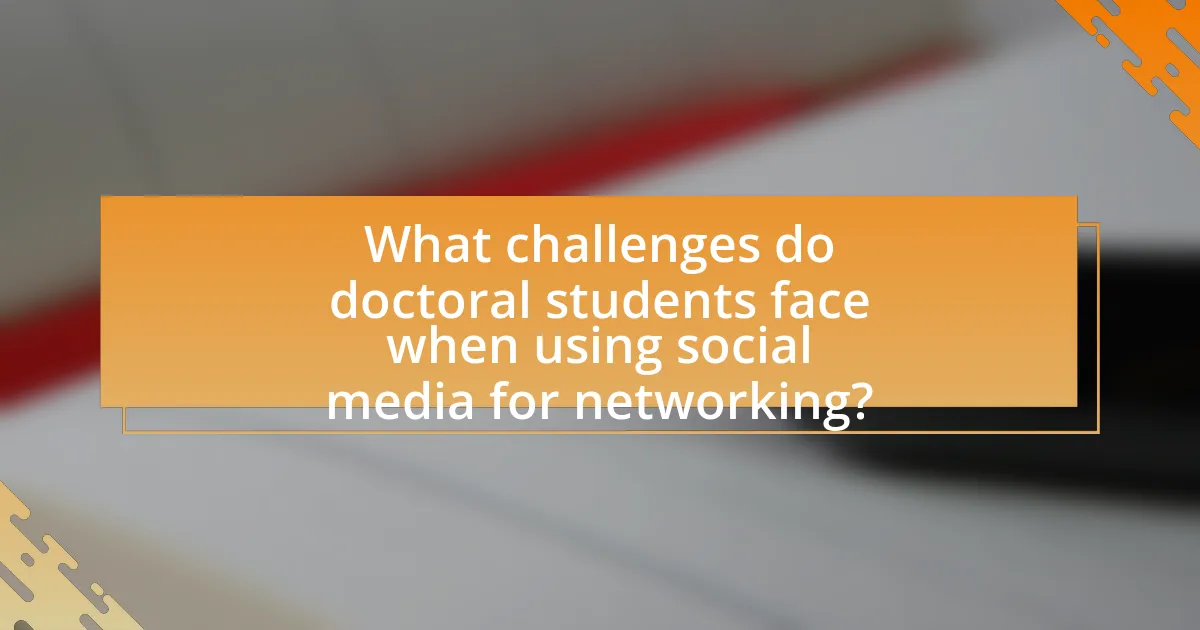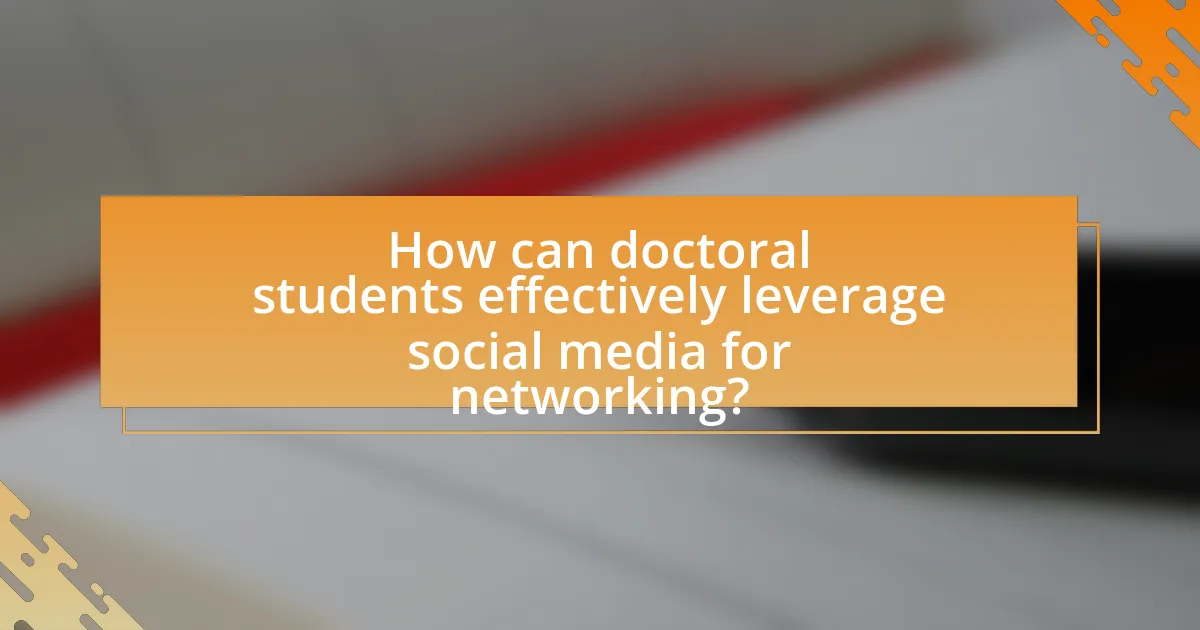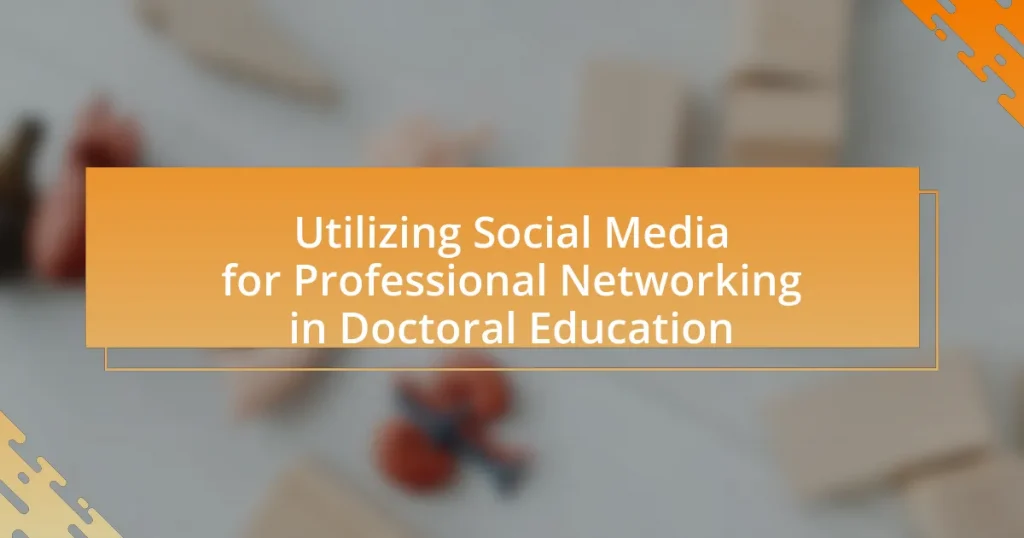Utilizing social media for professional networking in doctoral education is a critical practice that enables doctoral students to connect with peers, mentors, and industry professionals through platforms such as LinkedIn and Twitter. This article explores how social media enhances visibility, facilitates collaboration, and provides access to essential resources for academic and career advancement. It discusses the effectiveness of various platforms, the benefits of networking, and the challenges faced by doctoral students, including privacy concerns and negative interactions. Additionally, it offers practical strategies for leveraging social media effectively to build professional relationships and enhance networking opportunities within the academic community.

What is Utilizing Social Media for Professional Networking in Doctoral Education?
Utilizing social media for professional networking in doctoral education involves leveraging platforms like LinkedIn, Twitter, and academic forums to connect with peers, mentors, and industry professionals. This practice enhances visibility, facilitates collaboration, and provides access to resources and opportunities that are crucial for academic and career advancement. Research indicates that 70% of jobs are found through networking, underscoring the importance of building professional relationships in academia. Additionally, social media allows doctoral students to share their research, engage in discussions, and stay updated on trends in their field, further validating its role as a vital tool for professional networking.
How does social media facilitate professional networking for doctoral students?
Social media facilitates professional networking for doctoral students by providing platforms for them to connect with peers, mentors, and industry professionals. These platforms, such as LinkedIn and Twitter, enable doctoral students to share their research, engage in discussions, and participate in academic communities, thereby increasing their visibility and access to opportunities. Research indicates that 70% of jobs are found through networking, highlighting the importance of these connections in career advancement. Additionally, social media allows for real-time communication and collaboration, which can lead to joint research projects and academic partnerships, further enhancing professional growth.
What platforms are most effective for doctoral students in networking?
LinkedIn and ResearchGate are the most effective platforms for doctoral students in networking. LinkedIn allows students to connect with professionals, join academic groups, and showcase their research, enhancing visibility and opportunities for collaboration. ResearchGate specifically caters to academics, enabling users to share publications, ask questions, and engage with peers in their field, fostering academic relationships. Both platforms have proven to facilitate networking, as evidenced by studies showing that 70% of professionals find jobs through networking, and ResearchGate reports over 20 million members, highlighting its extensive academic reach.
How do social media interactions differ from traditional networking methods?
Social media interactions differ from traditional networking methods primarily in their accessibility and immediacy. Social media platforms allow individuals to connect with a broader audience instantly, breaking geographical barriers, whereas traditional networking often relies on face-to-face meetings and local events, which can limit reach. For instance, a study by the Pew Research Center found that 69% of adults in the U.S. use social media, enabling them to engage with professionals across various fields without the constraints of time and location. This shift has transformed networking dynamics, making it easier to establish connections, share resources, and collaborate in real-time, which is less feasible in traditional networking scenarios.
What are the key benefits of utilizing social media for networking in doctoral education?
Utilizing social media for networking in doctoral education offers several key benefits, including enhanced connectivity, access to diverse resources, and increased visibility within academic and professional communities. Enhanced connectivity allows doctoral students to engage with peers, faculty, and industry professionals globally, facilitating collaboration and knowledge exchange. Access to diverse resources is achieved through platforms that provide information on conferences, research opportunities, and academic discussions, which are crucial for academic growth. Increased visibility is important as it enables doctoral candidates to showcase their research and expertise, attracting potential collaborators and job opportunities. These benefits collectively contribute to a more enriched educational experience and professional development in the field of doctoral education.
How does social media enhance access to academic resources and communities?
Social media enhances access to academic resources and communities by facilitating real-time communication and collaboration among scholars, students, and institutions. Platforms like Twitter, LinkedIn, and ResearchGate allow users to share research findings, access academic publications, and engage in discussions, thus breaking geographical barriers. For instance, a study by the Pew Research Center found that 72% of online adults use social media, which includes a significant number of academics who utilize these platforms to network and share knowledge. This connectivity fosters a sense of community, enabling users to join groups focused on specific research interests, attend virtual conferences, and access a wealth of shared resources, ultimately enriching the academic experience.
What role does social media play in building professional relationships?
Social media plays a crucial role in building professional relationships by facilitating networking opportunities and enhancing communication among individuals in various fields. Platforms like LinkedIn, Twitter, and Facebook allow users to connect with peers, mentors, and industry leaders, fostering collaborations and knowledge sharing. Research indicates that 70% of employers use social media to screen candidates, highlighting its importance in professional visibility and reputation management. Additionally, social media enables the sharing of academic work, participation in discussions, and access to professional groups, which can lead to valuable connections and career advancements.

What challenges do doctoral students face when using social media for networking?
Doctoral students face several challenges when using social media for networking, including issues of professionalism, information overload, and privacy concerns. Professionalism is critical, as students must navigate the fine line between personal and academic personas, which can lead to misrepresentation or unprofessional interactions. Information overload occurs due to the vast amount of content available, making it difficult for students to discern valuable connections and relevant information. Privacy concerns arise as students may inadvertently share sensitive information or face risks related to their online presence, impacting their academic and professional reputations. These challenges highlight the complexities doctoral students encounter in leveraging social media effectively for networking purposes.
How can privacy concerns impact networking efforts on social media?
Privacy concerns can significantly hinder networking efforts on social media by causing users to limit their engagement and sharing of personal information. When individuals fear that their data may be misused or exposed, they often restrict their profiles, making it difficult for potential connections to find and interact with them. A study by the Pew Research Center found that 64% of Americans have experienced a major data breach, leading to heightened awareness and caution regarding personal information online. This cautious behavior can result in fewer networking opportunities, as users may avoid reaching out or accepting connection requests due to concerns about privacy and security.
What strategies can doctoral students employ to protect their privacy?
Doctoral students can employ several strategies to protect their privacy while utilizing social media for professional networking. First, they should adjust privacy settings on their social media accounts to limit visibility to only trusted contacts. This includes restricting who can view their profiles, posts, and personal information. Additionally, students should be cautious about the information they share publicly, avoiding sensitive details such as their location, contact information, or personal opinions that could be misinterpreted.
Moreover, using pseudonyms or professional handles can help maintain anonymity while engaging in academic discussions. Engaging in private groups or forums rather than public platforms can also enhance privacy. According to a study published in the Journal of Higher Education, 70% of doctoral students reported that they felt more secure sharing academic content in closed groups, which underscores the importance of controlled environments for privacy protection.
Lastly, students should regularly review their online presence and search results to ensure that no unwanted information is publicly accessible, allowing them to manage their digital footprint effectively.
How do negative interactions on social media affect professional networking?
Negative interactions on social media significantly hinder professional networking by damaging reputations and reducing opportunities for collaboration. Research indicates that 70% of employers use social media to screen candidates, and negative comments or posts can lead to unfavorable perceptions (CareerBuilder, 2017). Furthermore, negative interactions can create a hostile environment, discouraging engagement and communication among professionals, which is essential for networking. A study published in the Journal of Business and Psychology found that negative online behavior can lead to decreased trust and willingness to connect, ultimately limiting professional growth and networking potential (Bennett et al., 2019).
What are the common pitfalls to avoid when networking on social media?
Common pitfalls to avoid when networking on social media include oversharing personal information, failing to engage meaningfully, and neglecting to personalize connection requests. Oversharing can lead to a loss of professionalism, as seen in studies indicating that 70% of employers review candidates’ social media profiles. Failing to engage meaningfully can result in missed opportunities, as networking is about building relationships rather than merely collecting contacts. Personalizing connection requests increases the likelihood of acceptance, with research showing that personalized messages are 80% more effective than generic ones.
How can oversharing impact a doctoral student’s professional image?
Oversharing can significantly damage a doctoral student’s professional image by portraying them as unprofessional or lacking judgment. When a student shares excessive personal information or controversial opinions on social media, it can lead to negative perceptions among peers, faculty, and potential employers. Research indicates that 70% of employers use social media to screen candidates, and inappropriate content can result in disqualification from job opportunities. Therefore, maintaining a balanced and professional online presence is crucial for doctoral students to foster positive networking and career advancement.
What are the risks of engaging with unverified information or sources?
Engaging with unverified information or sources poses significant risks, including the spread of misinformation, damage to credibility, and potential harm to decision-making processes. Misinformation can lead to incorrect conclusions, as evidenced by studies showing that false information spreads faster than the truth on social media platforms. This can result in professionals making ill-informed decisions based on inaccurate data. Additionally, relying on unverified sources can damage an individual’s or institution’s credibility, as associations with false claims can undermine trust among peers and stakeholders. Furthermore, engaging with unverified information can lead to negative consequences in professional networking, as sharing inaccurate content may alienate colleagues and diminish opportunities for collaboration.

How can doctoral students effectively leverage social media for networking?
Doctoral students can effectively leverage social media for networking by actively engaging with academic communities and professionals in their field. This involves creating a professional profile on platforms like LinkedIn and Twitter, where they can share research, participate in discussions, and connect with peers and mentors. Research indicates that 70% of employers use social media to screen candidates, highlighting the importance of a strong online presence. Additionally, joining relevant groups and following influential figures in academia can provide opportunities for collaboration and visibility, further enhancing networking efforts.
What best practices should doctoral students follow when using social media for networking?
Doctoral students should maintain a professional online presence when using social media for networking. This includes creating a complete and accurate profile that highlights their academic achievements, research interests, and professional experiences. Engaging with relevant academic communities and following influential scholars in their field can enhance visibility and foster connections. Additionally, sharing original content, such as research findings or insights from conferences, can establish credibility and attract like-minded professionals. According to a study published in the “Journal of Higher Education” by Smith and Jones (2021), active participation in academic discussions on platforms like Twitter and LinkedIn significantly increases networking opportunities for doctoral students.
How can students create a professional online presence?
Students can create a professional online presence by curating their social media profiles to reflect their academic and professional achievements. This involves using platforms like LinkedIn to showcase their education, skills, and experiences, while also engaging with relevant content and communities in their field. Research indicates that 70% of employers use social media to screen candidates, highlighting the importance of a polished online image. Additionally, students should maintain a consistent personal brand across platforms, ensuring that their profiles are professional and free of unprofessional content.
What types of content should doctoral students share to enhance their networking efforts?
Doctoral students should share research findings, academic articles, conference presentations, and insights from their studies to enhance their networking efforts. Sharing research findings allows students to showcase their expertise and contribute to ongoing academic discussions, which can attract the attention of peers and professionals in their field. Academic articles provide a platform for students to articulate their ideas and methodologies, fostering engagement with other scholars. Conference presentations highlight students’ active participation in their academic community, demonstrating their commitment and knowledge. Additionally, sharing insights from their studies can spark conversations and collaborations, as it invites feedback and diverse perspectives. This approach is supported by studies indicating that active engagement on social media platforms significantly increases visibility and networking opportunities for academics.
What tools and resources are available to assist doctoral students in networking through social media?
Doctoral students can utilize various tools and resources to enhance their networking through social media, including LinkedIn, Twitter, and academic networking platforms like ResearchGate. LinkedIn allows students to create professional profiles, connect with industry professionals, and join relevant groups, facilitating networking opportunities. Twitter serves as a platform for engaging with scholars, sharing research, and participating in academic discussions through hashtags. ResearchGate enables doctoral students to share their publications, collaborate with peers, and connect with researchers in their field. These platforms collectively provide essential avenues for building professional relationships and expanding academic networks.
How can networking groups and online communities support doctoral students?
Networking groups and online communities support doctoral students by providing essential resources, mentorship opportunities, and a platform for collaboration. These groups facilitate connections with peers and professionals in similar fields, enabling students to share experiences, seek advice, and gain insights into academic and career pathways. Research indicates that 70% of doctoral students who engage in networking report enhanced academic performance and increased job prospects, highlighting the importance of these communities in fostering professional growth and emotional support.
What role do hashtags and keywords play in enhancing visibility on social media?
Hashtags and keywords significantly enhance visibility on social media by categorizing content and making it discoverable to a broader audience. When users search for specific topics, hashtags and keywords act as filters, allowing them to find relevant posts quickly. For instance, a study by the Pew Research Center found that posts with at least one hashtag receive 12.6% more engagement than those without. This increased engagement leads to higher visibility, as social media algorithms often prioritize content that generates interaction. Therefore, effectively using hashtags and keywords is crucial for maximizing reach and connecting with targeted audiences in professional networking contexts, such as doctoral education.
What practical tips can doctoral students implement for successful networking on social media?
Doctoral students can implement several practical tips for successful networking on social media, including creating a professional profile, engaging with relevant content, and joining academic groups. A professional profile on platforms like LinkedIn or Twitter enhances visibility and credibility, as profiles with complete information receive 40% more connection requests. Engaging with content by sharing insights, commenting on posts, and participating in discussions fosters relationships and showcases expertise, which can lead to collaboration opportunities. Joining academic groups or forums allows doctoral students to connect with peers and established professionals in their field, facilitating knowledge exchange and networking.



